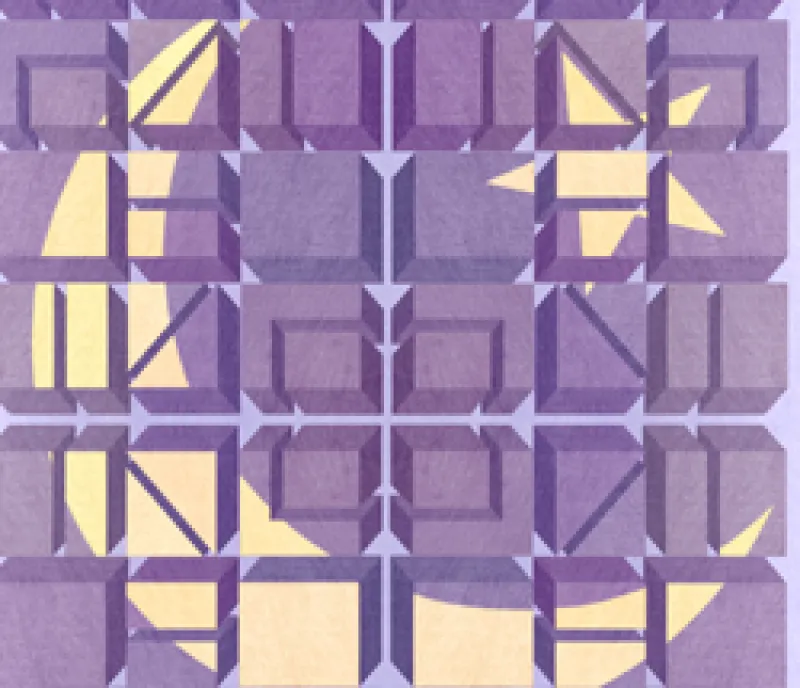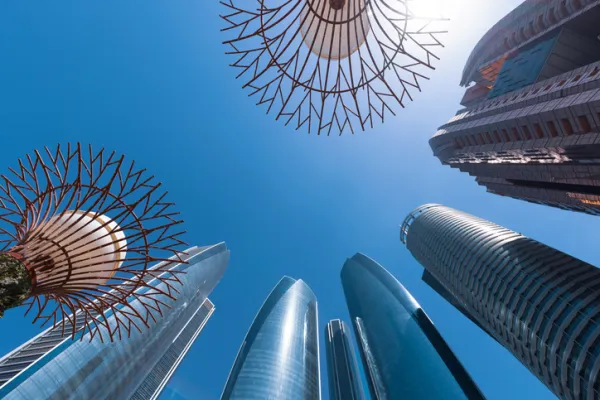As they were reviewing the bank’s funding needs recently, executives at HSBC Holdings decided to take a fresh look at sukuk, or Islamic bonds. Three years earlier the London-based bank had announced plans to issue up to $5 billion of sukuk under a medium-term financing program, but it never proceeded because the sukuk market, which seized up during the financial crisis, failed to recover. In recent months, however, a decline in yields and a revival of activity persuaded HSBC that the time was right to dust off its plans.
In June the bank’s subsidiary HSBC Bank Middle East sold $500 million of five-year sukuk priced to yield an expected 3.575 percent. It was the largest shari’a-compliant financing ever arranged by a non-Islamic institution. The deal saved money: ?At a yield of 155 basis points over midswaps, the cost was 15 to 20 basis points cheaper than the bank would have paid on a conventional bond issue. The offering also helped HSBC deepen ties with investors in the Gulf, an increasingly important market for the bank.
“We wanted to ensure we were capturing as much of the Islamic investor base as possible,” says Mohammed Dawood, head of global capital financing at HSBC in Dubai. “With this issue we ticked all of the boxes in terms of geographic distribution, Islamic accounts going into the transaction and overall successful secondary market trading as well.” About half of the deal was placed with investors in the Gulf, primarily family offices.
Once again, the sukuk market is open for business in the Gulf. In addition to HSBC, a number of regional entities have tapped the market recently. In May, Sharjah Islamic Bank, a leading Islamic lender in the United Arab Emirates, sold $400 million of sukuk yielding 4.75 percent and the Jeddah, Saudi Arabia–based Islamic Development Bank raised $750 million at 2.35 percent. Several other banks in the region are said to be considering entering the market later this year, and bankers say the Palestine Monetary Authority plans to offer its debut Islamic bond, worth about $50 million, this summer.
The market revival is part of the broader global economic recovery, says Afaq Khan, chief executive officer of Standard Chartered Saadiq in Dubai, the London-based bank’s Islamic banking subsidiary. “As the cost of capital has come down and adjusted to the new financial growth rates and companies are again looking at expansion, we’re seeing a growth in sukuk issues,” he says. “There is a lot of liquidity looking for a good credit, good management and a good growth story.”
In addition, the market upturn reflects some factors particular to sukuk. A lack of Gulf issuance over the past two years has created pent-up demand and lowered the yields available to borrowers, bankers say. Investor confidence has also recovered in the wake of defaults by two borrowers in 2009: Kuwait’s Investment Dar defaulted on a $100 million sukuk, and Saudi Arabia’s Saad Trading Contracting & Financial Services Co. failed to make payments on its $650 million issue after its owner, Maan al-Sanea, was hit with a multibillion-dollar fraud suit by Ahmad Hamad Algosaibi & Brothers Co., a Saudi conglomerate. Even Dubai, which roiled global markets in late 2009 when its flagship Dubai World conglomerate declared a standstill on billions of dollars in debt, appears to be on the mend following a bailout from the UAE.
“There are various sukuk maturities that are coming up this year and next. You have a dearth of supply,” says Yavar Moini, an executive director at Morgan Stanley in Dubai. “And Dubai credit is in better shape following the Dubai World resolution. There is a feeling amongst banks that the worst of the provisioning is behind them.”
Last month, Nakheel, the property arm of Dubai World, announced it would issue about $1.36 billion in sukuk to its contractors and other trade creditors as part of its restructuring plan. The company’s existing $3.52 billion sukuk, issued in 2006, remains the largest corporate issue ever. Markets indicate a growing confidence in Dubai’s fiscal health, with credit default swaps on Dubai debt trading at 335 basis points in mid-June, well below the peak of 702 basis points reached in 2009, when Dubai World declared its standstill.
“You can’t underestimate Dubai in developing the market and setting the benchmark for sukuk in the region,” says Adnan Hawari, head of fixed income at Zawya, a financial news and data provider based in Beirut.
The net result of these developments has been dramatic. Dollar-denominated sukuk issued by entities in the six-nation Gulf Cooperation Council (Bahrain, Kuwait, Oman, Qatar, Saudi Arabia and the UAE) were yielding about 4.6 percent in early June, down from about 6 percent three months earlier, according to the HSBC–Nasdaq Dubai GCC sukuk index. By contrast, the GCC conventional bond index was yielding 4.9 percent in June.
Total sukuk issuance between January and mid-June reached $40.9 billion, nearly three times the year-earlier volume of $14.2 billion, according to Zawya data.
Malaysia continues to account for the lion’s share of the market. Borrowers and investors there suffered relatively few negative effects from the financial crisis. The market recovery in the Gulf has been dramatic, though. GCC issuers accounted for $12.8 billion of the volume through mid-June, compared with $6.9 billion for all of 2010.
Much of the Gulf activity reflects a single jumbo issue. In January the Qatar Central Bank issued $9 billion of three-year sukuk to local banks to mop up excess liquidity. Aside from that deal, however, the pace of Gulf issuance has picked up notably in recent months. The increase is all the more remarkable because it has taken place amid social and political turmoil following populist uprisings in Tunisia and Egypt. The Arab Spring protest movement has shaken regimes across the region and prompted a violent crackdown on Shiite protesters by Bahrain’s Sunni government, but it hasn’t impeded a recovery in the sukuk market. “Despite the tragic events in Bahrain, the market is optimistic about the situation in the Gulf,” says Zawya’s Hawari.
Sukuk adhere to principles laid out in Islam. The instruments cannot relate to businesses involved in practices forbidden by the religion, including gambling and the production or consumption of alcohol. Interest is forbidden, so sukuk are structured in such a way that investors receive rental income or profit-sharing instead.
The main source of demand remains Muslim investors in the Middle East, for whom shari’a-compliant investments have a strong appeal. However, conventional investors are also returning to the market as a diversification move, bankers say. “We’re seeing orders from all kinds of Islamic banks, takaful [Islamic insurers] and investment managers,” says Standard Chartered Saadiq’s Khan. “We’re also seeing pockets of orders from pension funds. It’s very broad-based. They’re looking at the risk-reward trade-off” and finding sukuk attractive.
As welcome as the recent revival has been, bankers and lawyers say more needs to be done to ensure a lasting recovery. “The money is now there, but banks are being more selective by way of the credit profile and the structures that are being used,” says Ayman Khaleq, managing partner at law firm Vinson & Elkins in Dubai. “You don’t have a high tolerance for risk anymore.”
A large portion of the sukuk issued in Dubai between 2004 and 2007 were real estate leaseback transactions. When the emirate’s debt crisis hit, many investors discovered that they wouldn’t be able to seize the underlying property if the borrowers defaulted, because the property hadn’t been registered in the name of the financing vehicle that actually issued the sukuk. “There was no true sale of the assets that transfers the assets from the balance sheet of the borrower to the sukuk issuer,” Khaleq says. “In the UAE you have to register the sale” with the authorities, or the sale can be considered void.
These days investors are being more diligent. “Now they’re spending more time going through covenants and making sure security packages are more enforceable,” says Khaleq. “It’s not enough to say, ‘Here’s a sale contract.’ There has to be a transfer of title in the [Dubai] land department.”
The sukuk market also needs greater diversity. Nearly 90 percent of this year’s issues have come from sovereign or quasisovereign entities, according to Zawya. There should be more corporate issues for a truly robust market to develop, says Khaleq. Eventually, he says, he would like to see the development of specialized desks at Islamic banks, much like those at international investment banks. “We need to create larger Islamic banks with energy, telecom, what have you, as opposed to smallish banks, so they can lead the syndicates like the Wall Street banks do,” he says.
The Gulf market continues to suffer from a lack of standardization of ?bond documents. Underwriters need to hire their own shari’a scholars and obtain a fatwa, or ruling, that their issues comply with Islamic law every time they bring a borrower to market; this adds cost and complexity to each deal. “It almost has to be bespoke each time,” Khaleq says. “Each deal is created differently, whereas Malaysia has standardized these documents.”
The Hawkamah Institute for Corporate Governance in Dubai recently said it will put together a template for sukuk ijarah, used in sale and lease agreements in real estate purchases, to make issuance more efficient and reduce costs. The institute plans to release the template later this year along with the Bahrain-based International Islamic Financial Market as part of their efforts to strengthen corporate governance among Islamic financial institutions.
These efforts would align the Gulf with Malaysia, which has the world’s deepest Islamic capital market. As of June 15, Malaysian borrowers had issued $24.95 billion of sukuk this year, according to Zawya. In Malaysia term sheets for securities such as sukuk ijarah are standardized under guidelines set by Bank Negara Malaysia, the central bank and chief regulator. Unlike deals in the Gulf, there is very little room to negotiate terms. Issuers must obtain the approval of the central bank’s Shariah Advisory Council, which ensures consistent application of shari’a law.
Some bankers say the standardization issue is exaggerated. A lack of uniformity hasn’t prevented recent Gulf sukuk issues from attracting international investors, notes Standard Chartered Saadiq’s Khan. “These issues were oversubscribed,” he says. “Is there a need to improve standardization? Yes. Do I think about standardization every day? ?Yes. If ?I can reduce my time and cost to market, it benefits me. But we’ve overblown [the issue] a bit.”
Elsewhere, analysts say the Gulf market would benefit from consistent guidelines for credit ratings on sukuk. “Right now each investor has to do their own credit analysis,” says Mohd Daud Bakar, managing director of Amanie Islamic Finance Consultancy and Education in Dubai. “After the crisis investors are looking for more disclosure.” Obtaining ratings from an outside agency has been required policy in Malaysia since day one, he notes.
Although Malaysia dominates the sukuk market, almost all of the country’s issues are denominated in the local currency, the ringgit. Most Gulf offerings are denominated in dollars, for which there is greater demand both in the region and internationally. “That’s where the GCC plays a role,” says Morgan Stanley’s Moini.
In the Gulf, Bahrain has been considered the center of Islamic finance because of its strong regulatory environment, led by the Central Bank of Bahrain. It is home to the Accounting and Auditing Organisation for Islamic Financial Institutions. But sectarian violence on the island has damaged its reputation as a stable financial hub. Although the government in June lifted a state of emergency that was imposed in March following deadly clashes with protesters at the Pearl Roundabout, continued concern about possible turmoil there has led some financial institutions to consider relocating to Dubai.
Meanwhile, investor appetite for Dubai debt has increased in recent months. Despite the hangover that remains from the real estate bust, the emirate is seen as a safe haven amid the political instability engulfing the wider region.
Zawya’s Hawari wouldn’t write off Bahrain’s position as a leader in Islamic finance. In April, Bahrain brought a $530 million sovereign sukuk to market. “The unrest should have affected the Bahrain market,” he says. “Yet there was high demand. They were proud of this.”
Other Gulf countries are expected to see a rise in sukuk issuance as well. Qatar, which never suffered from the global credit crunch, is flush with revenues from its natural-gas fields. The kingdom is spending billions of dollars on a variety of projects: a new downtown in its capital, Doha; a new Doha international airport; and facilities for the 2022 World Cup, which the country will host. The sukuk market could be an important source of financing for many of those projects.
In February, Qatar ruled that all conventional banks must wind down their Islamic banking operations and stop taking Islamic deposits, because of concerns about commingling of funds. Analysts say the move should strengthen Islamic financial institutions there. Qatar Islamic Bank is expected to raise as much as $1 billion in sukuk later this year.
Oman, which lies along the Arabian Sea on the southern side of the Arabian Peninsula, announced in May that its central bank would for the first time allow Islamic financial structures within its banking system, in an effort to keep investment funds within the country.
More broadly, market observers hope the political renaissance inspired by the Arab Spring will also mean a resurgence in Islamic finance in one of the Arab world’s most storied markets. In the middle of the past century, Egyptian farmers turned to Islamic finance when looking for shari’a-compliant ways to fund their operations. Futures contracts were considered speculation and therefore haraam, or forbidden. But wary of stoking the influence of the Muslim Brotherhood, the government eventually banned Islamic finance.
Today, Egypt, the world’s fifth-largest Muslim nation, with 80 million people, is seen as the biggest potential new entrant into Islamic finance. Islamic banking currently makes up about 4 percent of Egypt’s $193 billion banking industry, according to a 2009 report by consulting firm McKinsey & Co. That compares with a 46 percent market share in the UAE.
Egypt is “a very good economy,” says Standard Chartered Saadiq’s Khan. “It would diversify the portfolio of Islamic financial institutions, and it would give more choices to investors.”
As Egypt sets about rebuilding infrastructure to shore up its economy, it will likely look to the Gulf for money and therefore will need to offer Islamic options to fully take advantage of the available capital.
Ties between the Gulf and the Arab world’s second-largest economy already exist. Abu Dhabi Islamic Bank owns 49 percent of the Cairo-based National Bank for Development, which is currently converting itself into an Islamic bank.
In the meantime, Egypt is trying to beef up its regulatory framework to accommodate sukuk. The Egyptian Financial Supervisory Authority announced in June that it would be amending its capital markets laws to facilitate a sukuk market. Experts say the government will need to draw up debt guidelines for sukuk issuance and remove tax barriers that make Islamic transactions commercially unviable.
“Without property amendments to the tax laws, there would be two taxes for the sale and for the leaseback,” says Amanie Islamic Finance’s Bakar. “Indonesia worked for years to remove this tax, which they did two years ago. Only then did they bring a sukuk to market.”
That holds true for other places hoping to grab a piece of the Islamic investing pool, including Russia and West African countries such as Senegal.
VTB Bank, Russia’s second-largest lender, plans to come to market later this year with a $200 million sukuk, bankers say, while Gazprombank, the lending arm of the giant Russian oil and gas producer, is in discussions with about ten Moscow companies to arrange sukuk and plans to meet with investors in the Gulf in September. A spokesman for VTB Capital, the bank’s investment banking arm, declined to comment on VTB’s issuing plans.
“Even in more-remote countries, they want to tap the Muslim wealth from the GCC,” says Zawya’s Hawari. “Even if you are a company in Russia or Australia, this is the way to attract the huge amounts of wealth, by issuing sukuk.” • •






